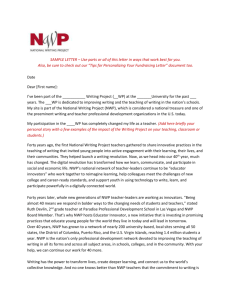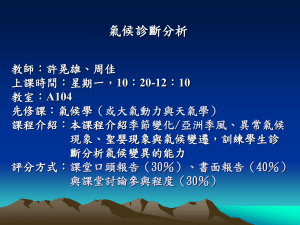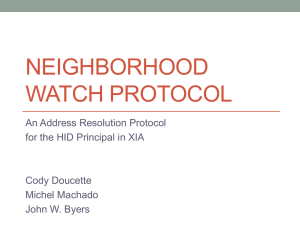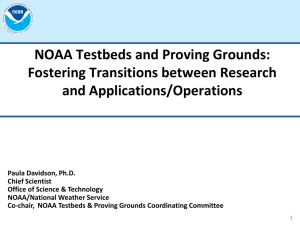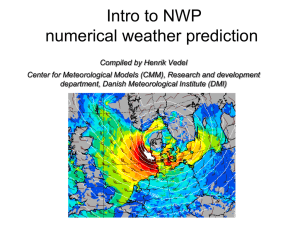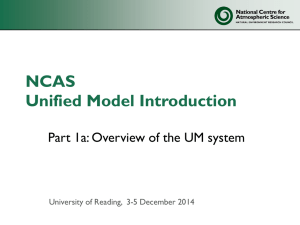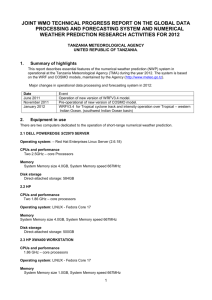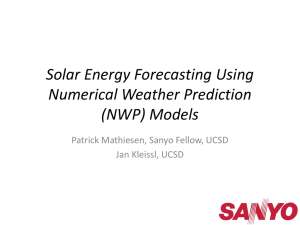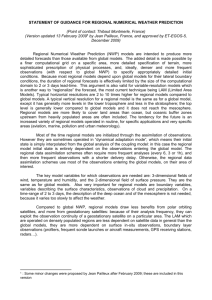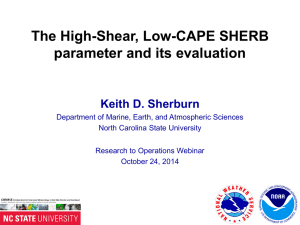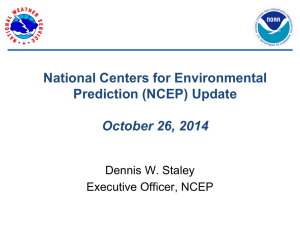U.S. Numerical Weather Prediction: Time for a Restructuring?
advertisement
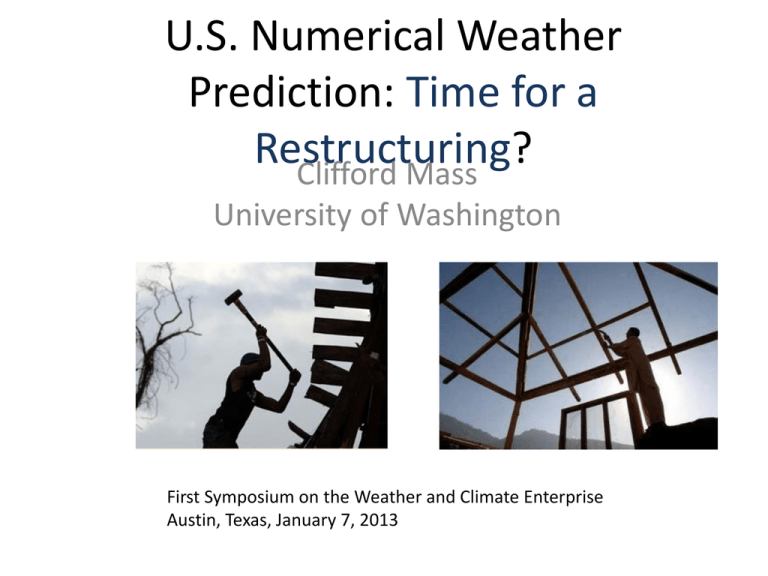
U.S. Numerical Weather Prediction: Time for a Restructuring? Clifford Mass University of Washington First Symposium on the Weather and Climate Enterprise Austin, Texas, January 7, 2013 “Mediocrity is self-inflicted.” Walter Russell U.S. NWP starts with huge advantages • Largest meteorological research community • Largest governmental weather prediction organization. • NWP began in the U.S. and most NWP breakthroughs began here. And still do. • Largest collection of governmental (e.g., NOAA OAR, GFDL) and quasi-governmental research labs (e.g., NCAR) in the area. • Vigorous private sector with substantial expertise in NWP and interest in NWP products. • The NWS has an excellent office system for interfacing with local communities. With all those advantages, the U.S. has lost leadership in NWP • Our global model (GFS) is clearly inferior to the ECMWF model-both for deterministic and ensemble-based forecasts. • Other nations have higher resolution and better post-processed mesoscale ensemble systems. • We have stagnated in the area of model postprocessing. A consistent story: ECMWF is best and the U.S. GFS is tied for second place with UKMET Graphics courtesy of NCEP ECMWF model is usually the most skillful for major storms: like Sandy …and the media and others have noticed The most disturbing part of this is story is not that we are behind the Europeans and others, but that we are well behind what this nation is capable of (which is far beyond ECMWF) And this secondary status is completely unnecessary and selfinflicted. In this talk I will discuss some of the reasons for U.S. NWP falling behind… • Poor leadership and lack of vision. • Inadequate computer resources. • Lack of cooperation between research and governmental NWP. • Lack of enterprise-wide coordination, prioritization and planning. • Structural organizational problems in NOAA. • Lack of extramural research support by NOAA/NWS. • A willingness to accept mediocrity. Lack of computer resources • NCEP’s Environmental Modeling Center (EMC) is responsible for a very wide range of numerical forecasts (global high-res and ensembles, national/regional high res and ensembles, wave and storm surge models, climate models, etc.), but has FAR less computation resources than ECMWF which does only global prediction. Lack of Computer Resources • ECMWF has two machines, each with 24546 cores and a computational ability of .75 petaflops. These machines are #37 and 38 on the worldwide list of top 500 computers. • The National Weather Service has two computers that are not even on the top 500 list. Each has 4992 processors and an ability to do .07 petaflops. • The NWS has less than 10% of the computer power as ECMWF and has many more responsibilities. Implications of inferior computational resources • ECMWF has the computer power to run their high-resolution global forecast at 16 km resolution, while ours is 25 km. • Their global ensemble forecasting system has twice the resolution as ours. • They can use an advanced data assimilation approaches (e.g., 4DVAR). • The U.S. runs a coarse, inferior regional ensemble system (SREF). But climate simulations get the big machines! • • • • NOAA's Fairmont, .38 petaflop DOE's Sequoia-20 petaflops DOE’s Titan-20, 27 petaflops … and many more! Fairmont Computer Jane Lubchenco : “It will help us tackle the great big huge problem of generating better information about climate change at the regional scale.” Poor organization in NOAA • The research supporting NWS NWP is NOT in the NWS, but in NOAA. • Thus, the heads of NCEP and EMC do not control the folks that provide the critical research for their mission (e.g., NOAA OAR, GFDL, etc.) • The result is inefficiency, working at cross purposes, and slowed Research to Operations (R to O). Research and operations needs to be in one entity NWP Research Operational NWP There is very little coordination of the research and operational communities U.S. NWP: The Uncoordinated Giant A prime example: Weather Research and Forecasting (WRF) model • After years of separation between the research and operational communities (e.g., Eta model versus MM5), many hoped that the NWS and NCAR could develop one mesoscale model that the entire community could use. • Never happened…the NWS went its own way with the Eta and NMM models, research community went with WRF ARW. • An unnecessary tragedy for our profession. But WRF became a brand name, with little meaning! Lack of Coordination • There is no group that coordinates the research and development of the U.S. NWP community to deal with pressing problems: – Deficiencies in boundary layer schemes – Optional approaches for creating mesoscale ensembles – High-resolution data assimilation. – And many more. • The result? Progress is slow and money is wasted. Lack of Coordination • One National Academy Committee after another has recommended that NCEP/EMC needs to have an advisory committee: never happens. • Might the proposed Weather Commission be a move in the right direction? Lack of rational observing system planning • Recently, the media has been abuzz about the expected gap in polar-orbiter weather satellite coverage, suggesting weather forecasting skill would decline. • The NOAA/NWS polar orbiter acquisition program has been characterized by mismanagement for years, not only delaying the next generation satellites, but costing the nation billions of dollars. Rational observing system design • NOAA/NWS needs to assess the optimal collection of observations, including dropping old data sources that are no longer needed. There is a rational way to do so through Observing System Simulation Experiments (OSSEs) and Observing System Experiments (OSEs). • NOAA/NWS has done very little of this and billions of dollars of hardware is being purchased without a clear understanding of the impacts of new sensors and satellites. And there is much more I have not had time to talk about…. • Lack of extramural support by the National Weather Service for applicable NWP research. • Glacial progress towards developing highresolution ensembles and probabilistic forecasts, with only one individual at NCEP working full time on this critical issue. • NWS leadership from the military that have not had the background and experience to lead a highly technological entity. No time… • Fifty year-old NWP post-processing approaches (MOS) still dominates. • Inadequate model verification effort. • No public strategic plan or vision document for U.S. NWP. So what needs to be done? • Secure a much bigger computer (10-500x) for NCEP or allow the NWS to take over Fairmont or another government machine. • Establish a framework for community cooperation and coordination. • Move NCEP’s EMC into NOAA and combine with relevant groups in OAR. • Begin a rational approach to observational system design. But most of all U.S. operational NWP need more priority, more leadership, and vision The problem is much larger than the National Weather Service. The End
